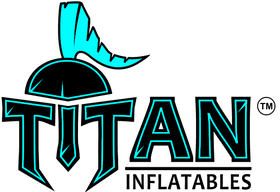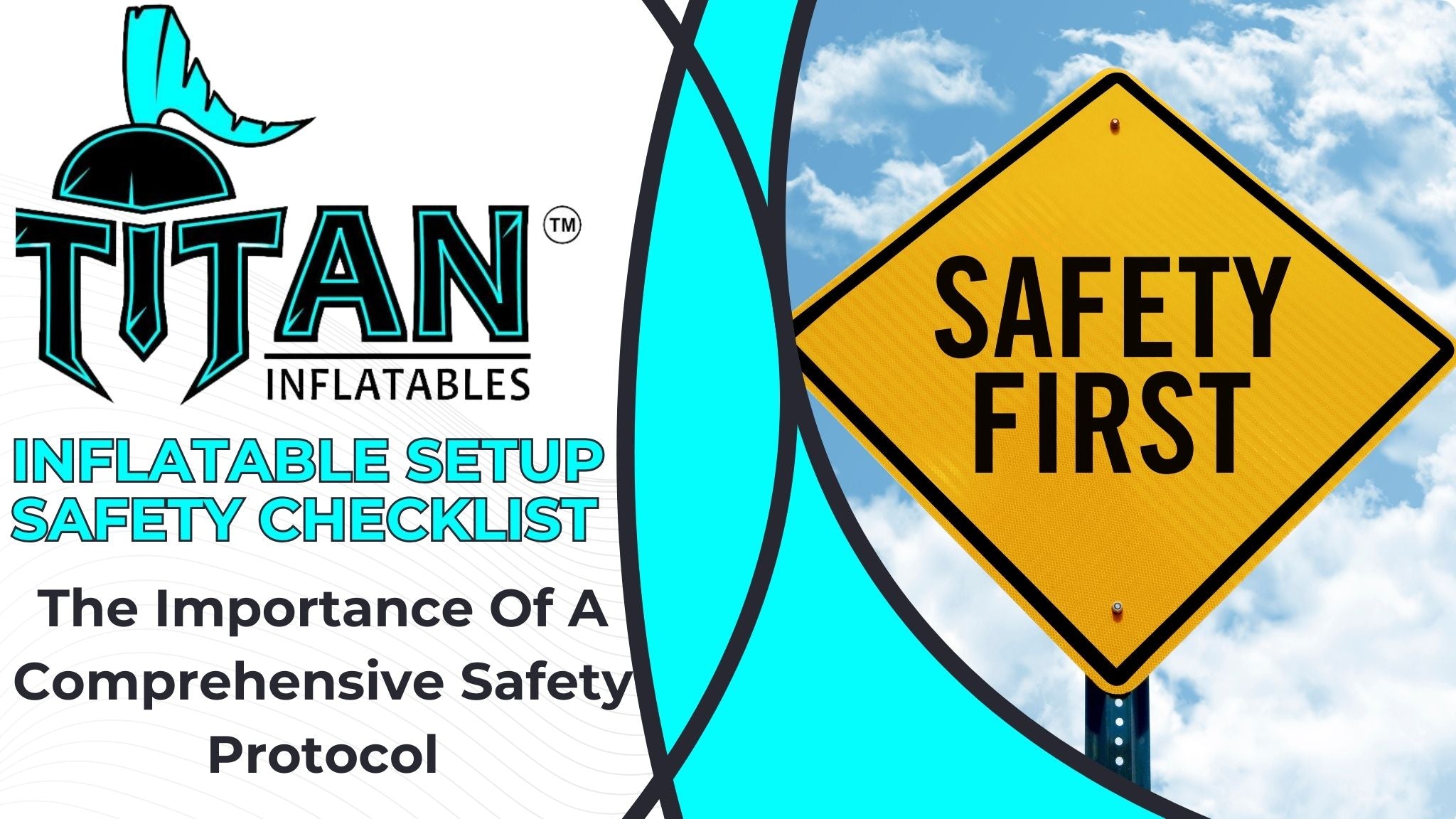Safety is the cornerstone of a successful inflatable rental business. Ensuring that every event is a safe environment for participants not only protects your clients but also safeguards your business from potential liabilities. At Titan Inflatables, we understand the importance of a comprehensive safety protocol for every event setup. In this guide, we'll outline a detailed safety checklist to help you ensure that your inflatable setups are secure and compliant with industry standards, providing peace of mind for both you and your clients.
1. Pre-Event Site Inspection
Before setting up any inflatable, it's crucial to inspect the event site thoroughly:
- Surface Check: Ensure the setup area is flat, level, and free of sharp objects, debris, or uneven surfaces that could damage the inflatable or cause tripping hazards.
- Space Clearance: Verify that there is adequate space around the inflatable for safe entry, exit, and overall use. Typically, a clearance of at least 5 feet around the inflatable is recommended.
- Overhead Clearance: Check for overhead obstructions such as tree branches, power lines, or structures that could interfere with the inflatable's operation.
- Ground Anchoring Points: Identify suitable anchoring points in the ground for securing the inflatable. These should be on solid ground and capable of holding the stakes or anchors firmly.
2. Inflatable Inspection Before Setup
Before inflating, perform a detailed inspection of the inflatable:
- Visual Inspection: Check for any visible damage, wear, or tear, such as rips, holes, or loose seams.
- Structural Integrity: Ensure all seams, stitching, and bonding areas are intact and secure.
- Cleanliness: Make sure the inflatable is clean and free of any debris or residue that could affect its performance or safety.
- Blowers and Cords: Inspect the blowers and electrical cords for any damage. Ensure that cords are free from fraying and that plugs are in good condition.
3. Proper Anchoring and Securing
Securely anchoring the inflatable is critical to prevent movement or tipping:
- Ground Stakes: Use the appropriate number of ground stakes, usually a minimum of six to eight, depending on the size of the inflatable. Stakes should be driven at a 45-degree angle and at least 18 inches into the ground.
- Sandbags or Weights: For setups on hard surfaces where stakes cannot be used, secure the inflatable with sandbags or other weights specifically designed for this purpose.
- Ropes and Straps: Check that all ropes and straps used for anchoring are in good condition and securely fastened to the inflatable and the anchoring points.
- Wind Conditions: Always monitor wind conditions. If the wind speed exceeds 15-20 mph, it is unsafe to operate the inflatable. In such cases, deflate and secure the inflatable immediately.
4. Electrical Safety
Proper handling of electrical equipment is essential to prevent hazards:
- Power Source: Use a grounded power source for the blower. If using an extension cord, ensure it is the correct gauge and designed for outdoor use.
- Weather Protection: Ensure all electrical equipment is kept away from water sources and protected from rain. Use weatherproof covers or position blowers in a sheltered area if possible.
- Circuit Breakers: If available, use circuit breakers or GFCI (Ground Fault Circuit Interrupter) outlets to prevent electrical shock hazards.
5. Inflatable Operation and Monitoring
Once the inflatable is set up, ongoing monitoring is essential to maintain safety:
- Proper Inflation: Ensure the inflatable is fully inflated and firm to the touch, with no sagging areas. Under-inflation can compromise structural integrity.
- Weight and Capacity Limits: Adhere to the manufacturer's weight and capacity limits for the inflatable. Clearly communicate these limits to users and monitor compliance.
- Supervision: Assign a responsible adult or trained operator to supervise the inflatable at all times. They should be familiar with safety rules and know how to respond in case of an emergency.
- Participant Rules: Set and enforce rules for participants, such as removing shoes, avoiding rough play, and not allowing flips or somersaults.
6. Weather and Environmental Conditions
Always be prepared to respond to changing weather and environmental conditions:
- Weather Monitoring: Continuously monitor weather conditions. High winds, rain, or lightning can create unsafe conditions for inflatable use.
- Emergency Procedures: Have a plan in place for deflating and securing the inflatable quickly in the event of sudden weather changes or emergencies.
- Sun Protection: If the inflatable is set up in direct sunlight, ensure that the surface temperature is monitored to prevent burns. Use shade structures if necessary.
7. Post-Event Breakdown and Inspection
Properly deflating and inspecting the inflatable after use is just as important as setup:
- Deflation and Storage: Turn off the blower and allow the inflatable to deflate completely. Fold and roll it carefully to avoid creases or damage. Store in a dry, cool place to prevent mold or mildew.
- Post-Use Inspection: Check the inflatable again for any damage or wear that may have occurred during use. Address any repairs before the next event.
- Cleaning: Clean the inflatable thoroughly before storing it. Remove any dirt, debris, or moisture to maintain its condition and longevity.
8. Documentation and Record-Keeping
Keeping detailed records of each event setup is important for both safety and liability purposes:
- Setup Checklist: Document that each step of the safety checklist has been completed for every setup.
- Incident Reports: If any incidents occur, record them immediately, including details of what happened and the actions taken.
- Maintenance Logs: Maintain logs of all inspections, repairs, and maintenance performed on each inflatable.
Conclusion: Prioritizing Safety with Titan Inflatables
At Titan Inflatables, we believe that safety is the foundation of a successful inflatable rental business. By following this comprehensive safety checklist for every event setup, you can ensure that your inflatables provide a fun and secure experience for all participants while protecting your business from potential risks. Our inflatables are designed with safety in mind, but it’s up to you to implement these best practices to create a safe environment at every event.
Remember, a safe event is a successful event. By prioritizing safety and adhering to industry standards, you not only enhance your reputation but also build trust with your clients. Let Titan Inflatables be your partner in delivering safe, enjoyable, and unforgettable experiences for every occasion.

